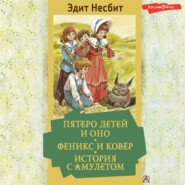По всем вопросам обращайтесь на: info@litportal.ru
(©) 2003-2024.
✖
Oswald Bastable and Others
Настройки чтения
Размер шрифта
Высота строк
Поля
Noël – for mysterious reasons unknown to Fame – is Alice's favourite brother, and of course she stood up for him, and said he didn't mean it.
And things were said on both sides, and the rest of us agreed with Dicky that Noël was old enough to know better. It ended in Alice and Noël going out for a walk by themselves as soon as Noël had had the crying washed off his hands and face.
The rest of us spent the shining hours in getting a board and nailing it up in the oak-tree for a look-out station, in case of Saracens arriving with an army to attack London. The oak is always hard to climb, and this was a peculiarly hard day, because the next-door people had tied a clothes-line to the oak, and hung their wet washing out on the line.
The sun was setting (in the west as usual) before Alice and Noël returned. They came across the wide fields from the direction of a pinewood that we had never explored yet, though always meaning to.
'There!' said Dicky, 'they've been and gone to the pinewood all by themselves.'
But the hatchet Dicky was still cherishing in his breast was buried at once under the first words spoken by the returning party of explorers.
'Oh, Oswald,' said Alice, 'oh, Dicky, we've found a treasure!'
Dicky hammered the last nail into the Saracen watch-tower.
'Not a real money one?' he said, dropping the hammer – which was a careless thing to do, and the author told him so at the time.
'No, not a money one, but it's real all the same. Let's have a council, and I'll tell you.'
It was then that Dicky showed that if he dropped hammers it was not because he could not bury hatchets. He said, 'Righto! There's room for us all up here. Catch hold, Noël. Oswald, give him a shove up. Alice and he can sit in the Saracens' watch-tower, and I'll keep hold of H. O. if you'll hand him up.'
Alice was full of the politest compliments about the architecture of the Saracens' watch-tower, and Noël said:
'I say, Dicky, I'm awfully sorry about your prize.'
'It's all right,' said Dicky; 'I rubbed it out with bread.'
Noël opened his mouth. He looks like a very young bird when he does this.
'Then my beautiful poem's turned into dirty bread-crumbs,' he said slowly.
'Never mind,' said Alice; 'I remember nearly every word of it: we'll write it out again after tea.'
'I thought you'd be so pleased,' Noël went on, 'because it makes a book more valuable to have an author's writing in it. Albert's uncle told me so.'
'But it has to be the same author that wrote the book,' Alice explained, 'and it was Cæsar wrote that book. And you aren't Cæsar yet, you know.'
'Nor don't want to be,' said Noël.
Oswald now thought that politeness was satisfied on both sides, so he said:
'What price treasures?'
And then Alice told. But it had to be in whispers, because the next-door people, who always did things at times when not convenient to us, were now taking in their washing off the line. I heard them remark that it was a 'good drying day.'
'Well,' Alice mysteriously observed, 'it was like this. (Do you think the Saracens' watch-tower is really safe for two? It seems to go down awfully much in the middle.)'
'Sit nearer the ends, then,' said Oswald. 'Well?'
'We thought we would go to the pinewoods because of reading in Bret Harte that the resinous balsam of the pine is healing to the wounded spirit.'
'I should have thought if anybody's spirit was wounded…' said Dicky in tones of heatening indignantness.
'Yes, I know. But you'd got the oak, and I expect oaks are just as good, if not better, especially for English people, because of Oakapple Day – and – Where was I?'
We told her.
'So we went, and it is a very nice wood – quite tulgy, you know. We expected to see a Bandersnatch every minute, didn't we, Noël? It's not very big, though, and on the other side there's an enchanted desert – rather bare, with patches of grass and brambles. And in the very middle of it we found the treasure.'
'Let's have a squint at the treasure,' said Dicky. 'Did you fetch it along?'
Noël and Alice sniggered.
'Not exactly,' said Alice; 'the treasure is a house.'
'It's an enchanted house,' said Noël, 'and it's a deserted house, and the garden is like in "The Sensitive Plant" after the lady has given up attending.'
'Did you go in?' we asked.
'No,' said Alice; 'we came back for you. And we asked an old man, and he did say it was in Chancery, so no one can live in it.'
H. O. asked what was enchancery.
'I'm certain the old man meant enchanted,' said Noël, 'only I expect that's the old-fashioned word for it. Enchanceried is a very nice word. And it means it's an enchanted house, just like I said.'
Nurse now came out to remark, 'Tea, my dears,' so we left the Saracens' tower and went in to that meal.
Noël began to make a poem called 'The Enchanceried House,' but we got him to stop till there was more for him to write about. There soon was more, and more than enough, as it turned out.
The setting sun had set, but it had left a redness in the sky (like one of those distant fires that you go after, and they are always miles from where you are) which shone through the pinetrees. The house looked black and mysterious against the strawberry-ice-coloured horizon.
It was a good-sized house. The bottom-floor windows were boarded up. It had a Sensitive-Plantish garden and a paved yard and outhouses. The garden had a high wall with glass on top, but Oswald and Dicky got into the yard. Green grass was growing between the paving-stones. The corners of the stable and coach-house doors were rough, as if from the attacks of rats, but we never saw any of these stealthy rodents. The back-door was locked, but we climbed up on the water-butt and looked through a little window, and saw a plate-rack, and a sink with taps, and a copper, and a broken coal-scuttle. It was very exciting.
The day after we went again, and this time we borrowed the next-door people's clothes-line, and by tying it in loops made a sort of rope-ladder, and then all of us got over. We had a glorious game besieging the pigsty, and all the military orders had to be given in whispers for fear of us being turned out if anyone passed and heard us. We found the pinewood, and the field, and the house had all got boards to say what would be done to trespassers with the utmost rigour of the law. It was such a swat untying the knots in the next-door people's clothes-line, that we only undid one; and then we bought them a new line with our own pocket-money, and kept the rope-ladder in a hidden bed of nettles, always on the spot and ready for us.
We found a way of going round, and getting to the house through a hole in a hedge and across a lane, so as not to go across the big fields where every human eye could mark our proceedings, and come after us and tell us not to.
We went there every day. It would have been a terrible thing if an army of bloodthirsty Saracens had chosen that way to march on London, for there was hardly ever a look-out in the tower now.
It was a jolly place to play in, and Oswald had found out what 'in Chancery' really means, so he had no fear of being turned into a pig-headed lady, or marble from the waist down.
And after a bit we began to want to get into the house, and we wanted it so much that our hearts got quite cold about the chicken-house and the pigsty, which at first had been a fairy dream of delight.
But the doors were all locked. We got all the old keys we could, but they were all the keys of desks and workboxes and tea-caddies, and not the right size or shape for doors.
Then one day Oswald, with his justly celebrated observingness, noticed that one of the bars was loose in the brickwork of a sort of half-underground window. To pull it out was to the lion-hearted youth but the work of a moment. He got down through the gap thus obtained, and found himself in a place like a very small area, only with no steps, and with bars above him, broken glass and matted rags and straw beneath his enterprising boots, and on one side a small cobwebby window. He got out again and told the others, who were trying to get up the cobblestones by the stable so as to make an underground passage into the stable at the ratty corner of its door.
They came at once, and, after a brief discussion, it was decided to break the window a little more than it was already, and to try to get in a hand that could unlatch the window. Of course, as Oswald had found the bar, it was to be his hand.

















